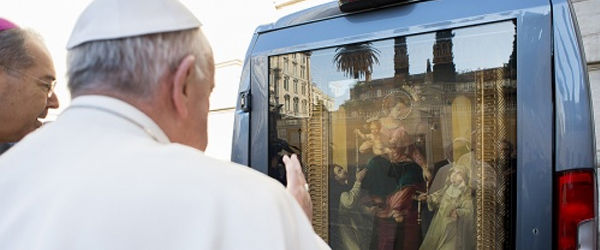We begin each Lent under the humble sign of ashes that symbolize dust: Remember that you are dust, and to dust you shall return!
Lent reminds us that life is brief. We are here on this earth only for a little while. One day our mortal bodies will turn to dust.
Our Holy Father Pope Benedict XVI also makes this point in his Lenten message for this year: “The time granted us in this life is precious for discerning and performing good works in the love of God.”
Our life may be short. But we are called to fill our lives with meaning and beauty through our faithfulness and love of Jesus and our charity and concern for others.
Loving concern for others is the heart of our life together in the Church and in the wider society. We have to support one another. We have to think beyond our own needs to anticipate the needs of our brothers and sisters.
Yet our culture seems to be losing this sense of common cause and mutual concern. People seem more isolated, more looking out for themselves.
The problem, I believe, is that our society is losing a sense of the fatherhood of God and a sense of his care and guidance of creation.
Many of our neighbors go about their lives as if God does not exist. They are not hostile to God. It is more like they have forgotten about him. God is just not a factor in what they think about or how they make decisions or what they do during the course of their day.
This indifference, a kind of practical atheism, has deep consequences for our society.
The declining feeling for God naturally leads to a declining feeling for our fellow human beings. If we do not believe God is our Father, we are not likely to believe that our neighbors are our brothers and sisters.
That is one reason we need this annual “reality check” of Lent. To be concerned for others, to be stirred to help them through love and good works, we need to grow in holiness. And for that, we need to know “who we are.”
When we hear those words, “Remember that you are dust,” we are meant to remember the Biblical scene of creation. These words bring us back to that moment when God created the first man from out of the dust of the earth and blew the Spirit of life into him. We are meant to remember that the human person, every man and woman, is created in God’s own image and likeness.
But we are also meant to remember the original sin of our first human parents.
Original sin disfigured and disordered the divine image in the human person and led God to speak those sad words that we hear on Ash Wednesday: “You are dust, and to dust you shall return.”
But those words point us to the promise of hope — that humanity will rise from dust to achieve the divine destiny that God intended.
Jesus shows us that we are children of God, born of the love of the Father. We are born to love and to be loved. And we do that by loving as Jesus loved.
Dust is not our destiny and death is not the final destination of our lives. The journey we begin on Ash Wednesday ends on Easter Sunday. The dust of death gives way to the light that streams from Jesus’ empty tomb.
That is why Lent is a season of hope. Because God sent his only Son, who is the true image of God in human likeness.
Jesus restored the divine image damaged by sin, through his obedient suffering and death on the cross.
So in Jesus, who lived a perfect human life, we see the beautiful truth of our lives and the true vocation that each of us has. Jesus shows us “who we are.” He shows us that we are children of God, born of the love of the Father. We are born to love and to be loved. And we do that by loving as Jesus loved.
The direction and purpose of our lives is to become more and more like Jesus, through the grace of God and our desire for holiness. The Catechism of the Catholic Church puts is beautifully: “The vocation of humanity is to show forth the image of God and to be transformed into the image of the Father’s only Son” (CCC, n. 1877).
Let’s pray for one another again this week. Let’s pray that we all use this time of Lent wisely to grow in our imitation of Jesus Christ, who is the perfect image of God and the perfect image of the human person.
And let us ask our Blessed Mother Mary to help us to grow in our love and fidelity to her Son, and to serve others as he served, in all charity and good works.
Follow Archbishop Gomez at: www.facebook.com/ArchbishopGomez.
{gallery width=100 height=100}gallery/2012/0224/gomez/{/gallery}

